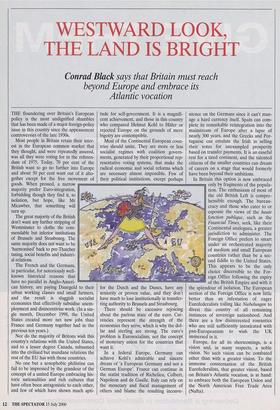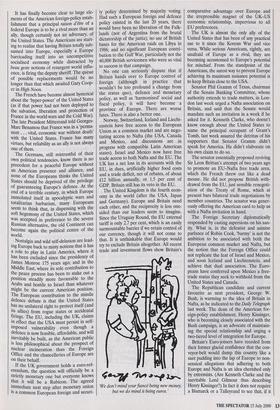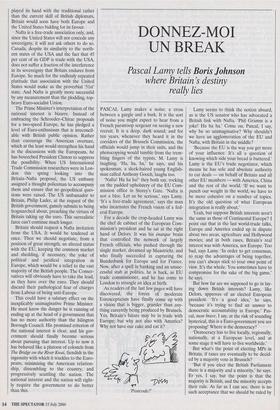WESTWARD LOOK, THE LAND IS BRIGHT
Conrad Black says that Britain must reach beyond Europe and embrace its Atlantic vocation
THE floundering over Britain's European policy is the most undignified shambles that has been made of a major foreign-policy issue in this country since the appeasement controversies of the late 1930s.
Most people in Britain retain their inter- est in the European common market that they thought, and were repeatedly assured, was all they were voting for in the referen- dum of 1975. Today, 70 per cent of the• British want to go no further into Europe and about 50 per cent want out of it alto- gether except for the free movement of goods. When pressed, a narrow majority prefer Euro-integration, forbidding though they find it, to isolation, but hope, like Mr Micawber, that something will turn up.
The great majority of the British don't want any further stripping of Westminster to clothe the com- mendable but inferior institutions of Brussels and Strasbourg. The same majority does not want to be 'harmonised' back to pre-Thatcher taxing, social benefits and industri- al relations.
The French and the Germans, in particular, for notoriously well- known historical reasons that have no parallel in Anglo-Ameri- can history, are paying Danegeld to their urban working classes and small farmers, and the result is sluggish socialist economies that effectively subsidise unem- ployment and disincentivise work. (In a sin- gle month, December 1998, the United States created more net new jobs than France and Germany together had in the previous ten years.) Nor do the majority of Britons wish this country's relations with the United States, and to a lesser degree Canada, subsumed into the civilised but mundane relations the rest of the EU has with those countries.
No one but a xenophobic philistine can fail to be impressed by the grandeur of the concept of a united Europe embracing his- toric nationalities and rich cultures that have often been antagonistic to each other, and few of which have shown much apti- tude for self-government. It is a magnifi- cent achievement, and those in this country who compared Helmut Kohl to Hitler or rejected Europe on the grounds of mere bigotry are contemptible.
Most of the Continental European coun- tries should unite. They are more or less socialist regimes with coalition govern- ments, generated by their proportional rep- resentative voting systems, that make the radical economic and social reforms which are necessary almost impossible. Few of their political institutions, except perhaps for the Dutch and the Danes, have any seniority or proven value, and they don't have much to lose institutionally in transfer- ring authority to Brussels and Strasbourg.
There should be excessive rejoicing about the parlous state of the euro. Cur- rencies represent the strength of the economies they serve, which is why the dol- lar and sterling are strong. The euro's problem is Eurosocialism, not the concept of monetary union for the countries that want it.
In a federal Europe, Germany can achieve Kohl's admirable and sincere dream of 'a European Germany and not a German Europe'. France can continue in the statist tradition of Richelieu, Colbert, Napoleon and de Gaulle. Italy can rely on the monetary and fiscal management of others and blame the resulting inconve- nience on the Germans since it can't man- age a hard currency itself. Spain can com- plete its remarkable reintegration into the mainstream of Europe after a lapse of nearly 300 years, and the Greeks and Por- tuguese can emulate the Irish in selling their votes for unexampled prosperity based on transfer payments. It is an easeful rest for a tired continent, and the talented citizens of the smaller countries can dream of careers on a stage that would formerly have been beyond their ambitions.
In Briain this option is now embraced only by fragments of the popula- tion. The enthusiasm of most of the old British Left is compre- hensible enough. The bureau- cracy and those who cater to or espouse the views of the haute fonction publique, such as the Financial Times, seek, like their Continental analogues, a greater jurisdiction to administer. The Foreign Office prefers to smart under an orchestrated majority of medium and small European countries rather than be a sec- ond fiddle to the United States. This appears to be the only choice discernible to the For- eign Office following the expiry of the British Empire and with it the splendour of isolation. The European section of the Foreign Office is now little better than an infestation of eager Eurofederalists toiling like Niebelungen to divest this country of all remaining instances of sovereign nationhood. And there are a few disinterested romantics who are still sufficiently intoxicated with pan-Europeanism to wish the UK immersed in it.
Europe, for all its shortcomings, is a vision and, in many respects, a noble vision. No such vision can be combated other than with a greater vision. To the immense consternation of the British Eurofederalists, that greater vision, based on Britain's Atlantic vocation, is at hand: to embrace both the European Union and the North American Free Trade Area (Nafta). It has finally become clear to large ele- ments of the American foreign-policy estab- lishment that a principal raison d'être of a federal Europe is to be a rival more than an ally, though certainly not an adversary, of the United States. The Americans are start- ing to realise that having Britain totally sub- sumed into Europe, especially a Europe barricading itself into an uncompetitive socialised economy while distracted by beau geste notions of resurgent world influ- ence, is firing the deputy sheriff. The queue of possible replacements would be no longer than that which awaited Gary Coop- er in High Noon. The French have become almost hysterical about the 'hyper-power' of the United States (as if that power had not been deployed to the salvation, liberation and protection of France in the world wars and the Cold War). The late President Mitterrand told Georges- Marc Benamou that France was in a 'perma- nent . . . vital, economic war without death' with the United States. France has many virtues, but reliability as an ally is not always one of them.
The Germans, still mistrustful of their own political tendencies, know there is no precedent for a peaceful Europe without an American presence and alliance, and none of the Europeans thinks the United States should be deprived of the privilege of guaranteeing Europe's defence. At the end of a terrible century, in which Europe immolated itself in apocalyptic wars and totalitarian barbarism, many Europeans seem to think that, in dispensing with the soft hegemony of the United States, which was accepted in preference to the severe Russian alternative, the old Continent can . become again the political centre of the world.
Nostalgia and wild self-delusion are lead- ing Europe back to misty notions that it has a role to play in Latin America, where it has been excluded since the presidency of James Monroe 175 years ago; and in the Middle East, where its sole contribution to the .peace process has been to stake out a Position steadily more favourable to the Arabs and hostile to Israel than whatever might be the current American position. The European contribution to the missile defence debate is that the United States has no unilateral right to protect itself (and its allies) from rogue states or accidental firings. The EU, including the UK, claims in effect that the USA must persist in self- imposed vulnerability even though a defence is now feasible, affordable, and will inevitably be built, as the American public is less philosophical about the prospect of nuclear incineration than the Foreign Office and the chancelleries of Europe are on their behalf.
If the UK government holds a euro-ref- erendum, the question will officially be a strictly monetary one but everyone knows that it will be a Rubicon. The agreed immediate next step after monetary union is a common European foreign and securi- ty policy determined by majority voting. Had such a European foreign and defence policy existed in the last 20 years, there would have been no liberation of the Falk- lands (nor of Argentina from the brutal dictatorship of the junta); no use of British bases for the American raids on Libya in 1986; and no significant European contri- bution to the Gulf War, particularly not the 40,000 British servicemen who were so vital to success in that campaign.
No one can seriously dispute that if Britain hands over to Europe control of foreign (although in practice that wouldn't be too profound a change from the status quo), defence and monetary policy, as well as 'harmonised' social and fiscal policy, it will have become a province of Europe. There are worse fates. There is also a better one.
Norway, Switzerland, Iceland and Liecht- enstein have free access to the European Union as a common market and are nego- tiating access to Nafta (the USA, Canada and Mexico, and discussions are in progress with compatible Latin American states). Israel and Mexico now have free trade access to both Nafta and the EU. The UK has a net loss in its accounts with the EU, in dues, artificially higher food costs and a trade deficit, net of rebates, of about £.12 billion annually, or 1.5 per cent of GDP. Britain still has its veto in the EU.
The United Kingdom is the fourth econ- omy in the world (after the USA, Japan and Germany). Europe and Britain need each other, and the reciprocity is less one- sided than our leaders seem to imagine. Since the Uruguay Round, the EU external tariff is only 2.7 per cent, which is an easily surmountable barrier if we retain control of our currency, though it will not come to that. It is unthinkable that Europe would try to exclude Britain altogether. All recent trade and investment flows show Britain's 'We don't mind your fiancé being new money, but we do mind it being euros.' comparative advantage over Europe and the irrepressible magnet of the UK—US economic relationship, impervious to all EU preferences.
The UK is almost the only ally of the United States that has been of any practical use to it since the Korean War and vice versa. While serious Americans, rightly, are unafraid of Europe as a rival, they are becoming accustomed to Europe's potential for mischief. From the standpoint of the Americans, the surest way to prevent Europe achieving its maximum nuisance potential is to keep Britain close to the USA.
Senator Phil Gramm of Texas, chairman of the Senate Banking Committee, whose authority extends to trade matters, in Lon- don last week urged a Nafta association on Britain, and said that the Senate would mandate such an invitation in a week if he asked for it. Kenneth Clarke, who doesn't know enough about the United States to name the principal occupant of Grant's Tomb, last week assured the detritus of his supporters that Senator Gramm didn't speak for America. He didn't elaborate on his own claim to do so.
The senator essentially proposed reviving Sir Leon Brittan's attempt of two years ago to promote an EU—Nafta free trade area, which the French threw out like a dead mouse. He did not propose British with- drawal from the EU, just sensible renegoti- ation of the Treaty of Rome, which at present bars bilateral trade negotiations by member countries. The senator was gener- ously offering the American card to help us with a Nafta invitation in hand.
The Foreign Secretary diplomatically responded by casting aspersions on his san- ity. What is, in the defeatist and asinine parlance of Robin Cook, 'barmy' is not the ambition to be associated with both the European common market and Nafta, but the notion that the Foreign Office could not replicate the feat of Israel and Mexico, and soon Iceland and Liechtenstein, and achieve that dual association. The Euro- peans have conferred upon Mexico a free- trade status they seek to withhold from the United States and Canada.
The Republican candidate and current favourite as next president, George W. Bush, is warming to the idea of Britain in Nafta, as he indicated to the Daily Telegraph last week. The dean of the American for- eign-policy establishment, Henry Kissinger, who is becoming closely associated with the Bush campaign, is an advocate of maintain- ing the special relationship and urging a two-tiered level of integration for Europe.
Britain's Euro-joiners have receded from their former glacial confidence that the con- veyor-belt would dump this country like a suet pudding into the lap of Europe to non- sensical allegations that adhering to both Europe and Nafta is an idea cherished only by extremists. (Are Kenneth Clarke and the inevitable Lord Gilmour thus describing Henry Kissinger?) In fact it does not require a Bismarck or a Talleyrand to see that, if it played its hand with the traditional rather than the current skill of British diplomats, Britain would soon have both Europe and the United States bidding for its favour.
Nafta is a free-trade association only, and, since the United States will not concede any sovereignty, it will not ask others to do so. Canada, despite its similarity to the north- ern states of the USA and the fact that 45 per cent of its GDP is trade with the USA, does not suffer a fraction of the interference in its sovereignty that Britain endures from Europe. So much for the endlessly repeated platitude that association with the United States would make us the proverbial '5 1st' state. And Nafta is greatly more successful by any measurement than the plodding, top- heavy Euro-socialist Union.
The Prime Minister's interpretation of the national interest is bizarre. Instead of embracing the Schroeder–Chirac proposals for a two-speed Europe, he has pledged a level of Euro-enthusiasm that is irreconcil- able with British public opinion. Rather than encourage the American overture, which at the least would strengthen his hand in the discussions with the Europeans, he has beseeched President Clinton to suppress the possibility. When US International Trade Commission researchers were in Lon- don this spring looking into the Britain–Nafta proposal, the US embassy assigned a thought policeman to accompany them and ensure that no geopolitical ques- tions were raised. The US ambassador to Britain, Philip Lader, at the request of the British government, gamely submits to being frogmarched about, preaching the virtues of Britain taking up the euro. This surrealistic farce can't continue much longer.
Britain should request a Nafta invitation from the USA. It would be tendered at once. Then we should negotiate, from a position of great strength, an altered status with the EU, keeping the common market and shedding, if necessary, the yoke of political and juridical integration in Europe, which would be a relief to the vast majority of the British people. The Conser- vatives will obviously have to take the lead, as they have over the euro. They should discard their pathological fear of charges from Labour of being anti-Europe.
This could have a salutary effect on the inexplicably unimaginative Prime Minister. He must know the danger he is running of ending up at the head of a government that has no more authority than the Islington Borough Council. His promised criterion of the national interest is clear, and his gov- ernment should finally become serious about pursuing that interest. Up to now it has behaved like a platoon of colonels from The Bridge on the River Kwai, fiendish in the ingenuity with which it truckles to the Euro- peans, minimising the American relation- ship, dissembling to the country, and progressively scuttling the nation. The national interest and the nation will right- ly require the government to do better than this.




























































 Previous page
Previous page